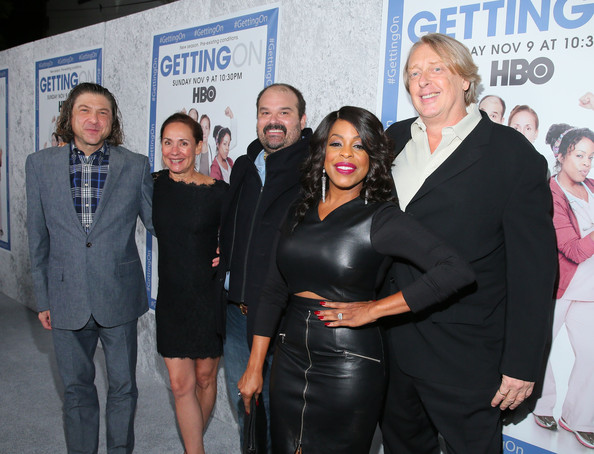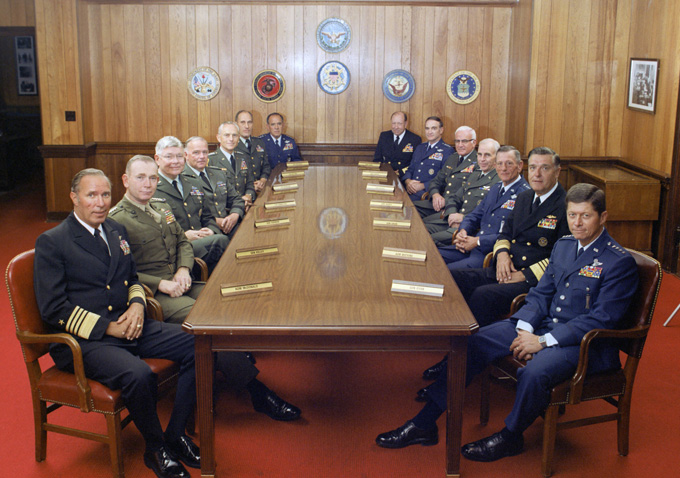
Mark V. Olsen (L) Will Scheffer (R) (Photo credit: Lacey Terrell / HBO)
I spoke with series creator, executive producer and writer Will Scheffer about the third and final season of his Emmy-nominated HBO series GETTING ON. We talked about his collaboration with his husband Mark V. Olson on this series, adaptation, the characters’ evolution, and more.
Based on the BBC series of the same name, GETTING ON is created for American television by Mark V. Olsen and Will Scheffer (co-creators of the acclaimed HBO series Big Love), the show follows the daily lives of overworked nurses and doctors as they struggle with the darkly comic realities of tending compassionately to their aging charges in a rundown, red-tape-filled hospital extended-care wing, blending outrageous humor with unexpected moments of tenderness.

KOUGUELL: What did you learn as a writer and producer during these three seasons?
SCHEFFER: I think I always learn the same thing: “It’s about the people, stupid.” I learn it different ways, dealing with different problems and crisis and joys — but it’s about the people you collaborate with in all aspects of the production and also the people you’re doing it for. I also learned you can shoot a TV show in three days and it can still be excellent if you’re working with the right people.
KOUGUELL: Do you feel that your writing and/or collaboration with Mark has changed since Big Love and if so, how has it evolved?
SCHEFFER: It has. A lot. I used to be the first draft guy (and I still am on some or our projects) and then we’d trade drafts from there — but Mark really ran with the drafts of GETTING ON. And I felt more like I was connected to him at the hip, channeling. We talk a lot more now — before and during the drafting and we solve problems together like in a “dialogue” and then he’ll execute that in the writing.
GETTING ON developed in a special way because of time factors and other things, but I did less actual typing and more talking and feeding answers to Mark’s questions. It really felt like a good process for this show. We’ve already written three other “shows” where I did the first draft and Mark is the closer. And then I’ll get it back for some light polish. But GETTING ON was the show where I think I’d say we became a real writing team. With Mark I/we become better. We trust each other. I’ve had almost the same amount of time as a solo act and a duo 15 years and 10 years, respectively — and I know I’d have a body of work and a career without Mark, but I doubt very much I’d have this career. I’m grateful he finally pushed me into collaborating because he made me a better writer and thinker and luckily it’s made our marriage richer, too. We still write some things solo and we help each other on those. I’m a producer on some scripts of Mark’s that I never could have written and I’m just as proud of those as of our work together.
KOUGUELL: How much input, if any, do the actors have on the scripts?
SCHEFFER: I’d say they contribute. They make it better. But we hold the keys to that particular kingdom.
KOUGUELL: On the show’s trailer you mentioned that you are “digging deeper into the characters this season by introducing their family members.”
SCHEFFER: I think the whole season is about allowing the characters to become the patients, in a way. Their stories are what we’d usually call “the patient” stories.” Sure, we have a few great “guest patient” turns — but the show really comes together this year. It takes off like a plane.
KOUGUELL: How have the characters evolved from the first to your final season?
SCHEFFER: Well, like all good TV characters they haven’t evolved too much. I’d say they’ve become more themselves, if anything. Have they grown and learned why they were so f***ed up? No. But maybe they’ve admitted they were a little screwy to begin with. And they all so surprise us this year in ways you’ll have to watch to see. They’ve become more sure of who they are. They have to me, never been more of a joy to behold.
In a January 2014 article for this publication, I spoke with Will Scheffer about Season 1of this series in which he also offered insightful tips on pitching projects.
Learn more about GETTING ON: http://www.hbo.com/getting-on


























